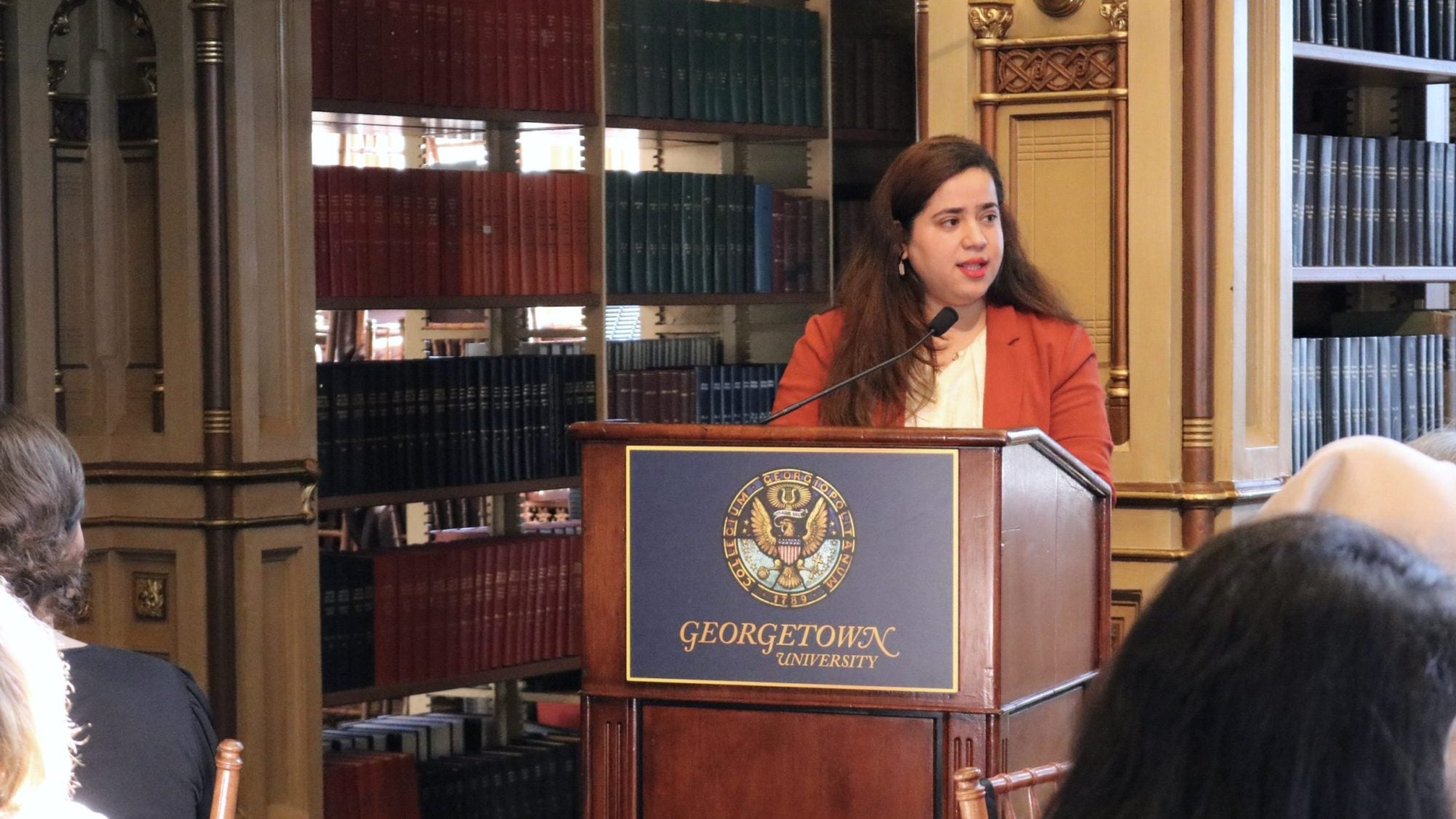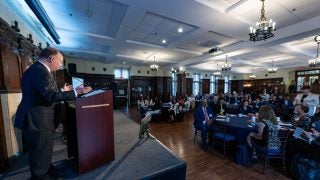In April, Georgetown hosted two events to support Afghan women and girls’ access to education and advocacy.
The U.S.-Afghan Women’s Council, based at Georgetown University, recently launched a university collective to magnify scholarships and logistical support for Afghan refugees and students.
And the Georgetown Institute for Women, Peace and Security (GIWPS) hosted its third annual retreat for Afghan women leaders, most of whom were forced to flee Afghanistan in 2021 after the Taliban took power.
Afghanistan is the worst country to be a woman, according to GIWPS’ rankings in its 2023 Women, Peace and Security Index. Women’s rights have been squelched in the Taliban’s wake, and girls have been banned from attending school past the sixth grade, according to the United Nations’ entity, UN Women.
“The Taliban are methodically and intentionally making Afghanistan unlivable for women…relegated to the status of second-class citizens, women and girls have no space for recourse in a system of gender-based segregation so severe that it has been described as gender apartheid,” GIWPS Executive Director Ambassador Melanne Verveer said in her opening remarks at the retreat.
Learn more about recent university efforts to support Afghan women leaders and students.
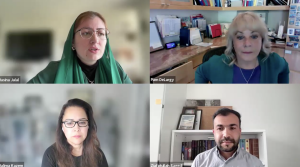
Scholarships for Afghan Students
Georgetown is a founding member of the University Network for Afghan Women, which aims to amplify universities’ impact in reaching Afghan students.
On April 23, the network convened 20 universities, U.S-Afghan Women’s Council members and partner organizations to share their work and best practices on providing scholarships for tuition, room and board to Afghan students, as well as logistical support in traveling to the U.S. They also discussed collaborations on course offerings, including online education for women in Afghanistan.
American University of Afghanistan, New York University, Boston University, Stanford and Georgetown are among the 11 founding members.
“Over the past two years, U.S. universities have stepped up to help evacuate and support these new arrivals and to address the oppression and economic hardship of the 19 million women and girls remaining in Afghanistan,” says Phyllis Magrab, vice chair of the U.S.-Afghan Women’s Council and a Georgetown professor of pediatrics.
“Through the U.S. Afghan Women’s Council at Georgetown University, we’re able to connect these universities and amplify our impact, and look forward to growing this important network.”
The U.S.-Afghan Women’s Council was founded in 2002 as a partnership between Georgetown and the U.S. State Department. The council is based at Georgetown and is co-chaired by Georgetown President John J. DeGioia and the U.S. Ambassador-at-Large for Global Women’s Issues, Geeta Rao Gupta.
In 2020, the U.S.-Afghan Women’s Council served more than 45,000 Afghan students, ran more than 60 hospitals or clinics, and trained over 2,000 women in entrepreneurship programs.
The organization also recently hosted an art exhibit featuring rescued art from Afghan women in collaboration with No Lost Generation, a Georgetown student group that seeks to raise awareness about refugees.
“We know Afghanistan is the worst country in the world for women’s education. We’ve heard a call to action from our network members for universities to prioritize Afghan students and make room in their budgets to support those who want to come to the United States,” said Dovie Holland, executive director of the USAWC.
Going forward, the network seeks to continue to provide online university education, train Afghan women entrepreneurs, advocate for the rights of Afghan women to education and other human rights, and support Afghan women refugees through scholarships, housing and other wrap-around support services.
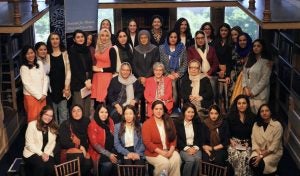
A Retreat for Afghan Women Leaders
GIWPS hosted its third annual retreat at Georgetown to unite Afghan women leaders in their fight for the rights of women and girls in Afghanistan.
Most of the attendees, who include human rights defenders, activists and journalists, were forced to flee Afghanistan in August 2021 after the Taliban took power. GIWPS worked with partners to evacuate many of them from Afghanistan — along with some 1,200 others — because their roles as high-profile activists, journalists and government officials made them prime targets of the Taliban.
Every year since, they’ve gathered at Georgetown to focus on leadership development, advocacy and action, professional coaching and celebration.
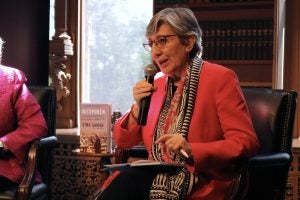
This year’s retreat included discussions with Verveer and members of the United Nations, State Department and former chairperson of Afghanistan Independent Human Rights Commission and the first Minister of Women’s Affairs of Afghanistan Dr. Sima Samar.
“If we want to exist, if we want to live with dignity, we have to continue to struggle,” said Dr. Samar when asked how she holds onto hope. “If you send money for a pen and pencil for one girl in your own village, that is resistance and hope.”
The retreat is part of GIWPS’ Onward for Afghan Women initiative, which equips exiled leaders with the skills and opportunities to continue their advocacy on behalf of Afghan women and girls.
